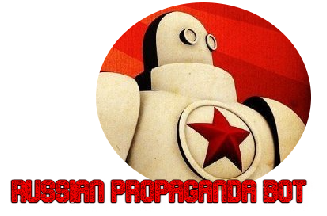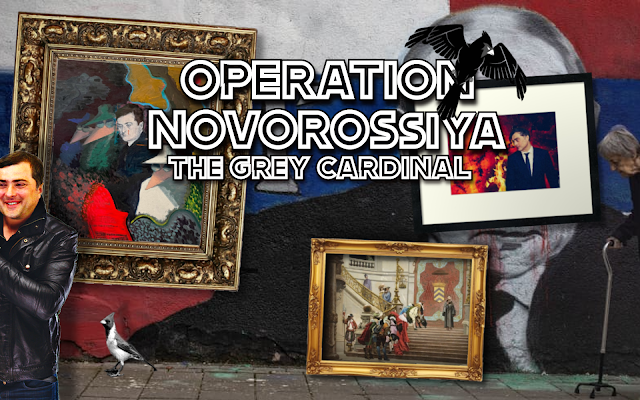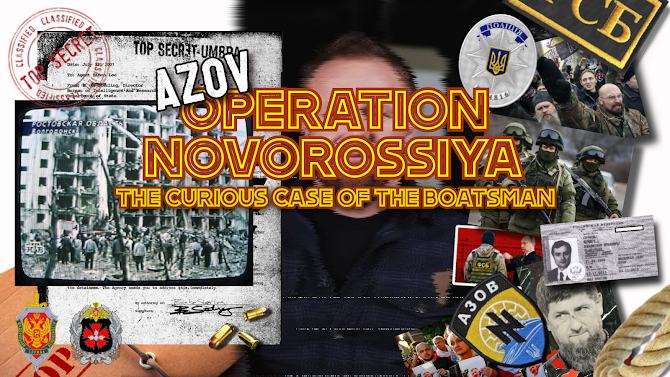OPERATION NOVOROSSIYA: Part 3 of 6: The Grey Cardinal (Art of Surkov)
In 2004, Before this GRU operation was at its streamlined global stage, the roots of this movement were just beginning to take hold, the early, dirty, and ugly part of this operation. Putin, taken by surprise by the Orange Revolution in Ukraine, would turn to the man he trusted to make sure revolts like this would never reach his doorstep again, Vladislav Surkov aka The Grey Cardinal. Surkov would turn to Russia's oldest reliable tool of clandestine warfare: Maskirovka
Rise of Putinism
In March of 2004 Putin hired a new “personal aide”, a young and influential rising political star named Vladislav Surkov (real name Aslambek Dudayev) aka The Grey Cardinal, a nephew of famed anti Russian warlord/terrorist and former Chechen President Dzhokhar Dudayev (crazy right?) Surkov got his start working as the head of marketing for now exiled former billionaire Mikhail Khodorkovsky, Surkov raised through the ranks, eventually becoming the head of PR for several of Khodorkovsky's companies, including Bank Menatep, Rosprom and Alfa-Bank. In which he served as Putin's personal ATM, funneling billions into Putin's pockets and shell companies. Before receiving this new position as “aide”. During this time he was already conceiving and planning a widespread directive whose main mission was to create influence within foreign governments and to destabilize society with the real goal to eventually creating a pretext for the war for Ukraine.
By being Putin's aide, it would not only give him direct access to Putin, but to also make sure Putin had full oversight of these new plans and operations. Surkov was an avid art collector, and he used a brilliant technique for auctioning by actually bidding for his own art by staging fake bidders disguised as private art collectors. During the auctions he would purposely over-inflate the price of the artwork by staging fake bidding wars, where one side would bid against the other, not knowing that they were both actually pawns under the same master, resulting in other bidders being forced to pay criminal amounts of money for pieces that were already overpriced. The strategy was a GRU Psyop called Reflexive Control. Developed by mathematician Vladimir Lefebvre in the 60s for the KGB, it is a process of active measure designed for your opponent to be unaware that he is being manipulated, and make decisions that would be beneficial to his enemy. He used this method, along with his years of propaganda and PR work to begin campaigns of influence and interference within his personal businesses and of course eventually, Western Governments. By supporting opposing political parties and pushing propaganda for opposing parties with different agendas it would inadvertently cause confusion, leading all sides of an issue pointing fingers at each other all while calling each other's narratives fakes thus eventually leaving the public not knowing what's real or what's not. As long as both sides scream fake, Russian propaganda war wins.
Surkov would go to be an expert in the works of Vladimir Lefebvre, he would use Lefebvre theory of "2 Systems of Ethical Cognition" to develop his "3 Pillars of Putinism". The authoritarian political system that Russia is using to this day. Lefebvre's studies proved that the average Russian would accept unethical and immoral actions as long as the outcome was favorable, while the West overwhelmingly would not. Surkov claimed that Westerners' biggest weakness is their constant need for ethical standards from their military (including Intelligence agencies) and criticism of their government's actions. Something that Russians, after years of authoritarian rule, were not particularly concerned about.
 |
Surkov – known in Russia as "the gray cardinal" for his behind-the-scenes political machinations but he might as well be named the The Grey Wizard. Russias secret mastermind |
The invasion of Ukraine was not as black as white as it seems, no matter what narrative you follow. Surkov for years perfected a strategy for the stability of future Russia, and he believed that without the expansion of the empire, Russia is doomed to fail. For centuries, the Russian state, with its harsh and sedentary political interior, has been preserved solely due to the relentless striving beyond its own borders. It has long forgotten how to survive, and most likely, it will never be able to survive in other ways. For Russia, constant expansion is not just one of the ideas, but a genuine existential confirmation of its historical existence. Surkov believed that annexing Crimea was a perfect example of Russia’s brilliant foresight and power, and the lack of a response was proof the global community is powerless and divided, and the USA was unstable and divided. It in hindsight was a perfect execution of Lefebvre's Reflexive Game Theory. It seemed Surkov gloated in his own work. His oversight and mission planning was responsible for the GRU operation into the influence campaign of the U.S. political system and the 2016 election of Donald Trump. However, Surkov and Putin's distaste for America was far more than paranoia, Surkov genuinely felt that the U.S. and their "Jewish" masters created the internet as the perfect weapon against the Russian motherland. That the open flow of information was meant to destabilize Russian society, and allow the public to become vulnerable and agreeable to the U.S. and its Western policies, which would in effect be the demise of Russia and other authoritarian states. He believed the Internet was a spawn of the devil and against the principles of god, and Russia’s 20 years of growth and modernization (the golden age he called it) a false dream that was bound to fade away. Russia can only survive if its in a state of war, and he felt that nobody had the testicle fortitude to stand in their way.
Surkov's beliefs were published in a manifesto available to the public in 2019 following up his hacked emails in 2016 known as "The Surkov Leaks". It was a collection of over 4000 detailed emails from 2013-2016 acquired through the hacking of the Kremlins server. It was not received well by Putin and the Intelligence world, feeling he revealed all of the Kremlins' goals and aspirations of global domination. When Ukraine was mentioned, Surkov revealed that the invasion in 2014 and the upcoming invasion in 2022 were not in fact due to a country seized by Nazis and fascists begging for Russian intervention in order to help the Russian-speaking population. But in his own words ““a clear example of the consolidation of society at the expense of the chaotization of a neighboring country”. Openly admitting that all the political instability and destabilization of Ukrainian society was in fact a pre-determined outcome of his strategical chess game and intuition. Which involved purposely inserting waves of criminality and instability within the Ukrainian borders. It would also touch on his theory that in Physics, chaos (disorder), never diminishes, but on the contrary, almost always increases. Meaning that Russia not only wants a chaotic world order but requires it to survive. Going back to the GRU directive that national survival requires the nation to be in a constant state of war, a hybrid war.
The leaked email accounts of Surkov also shed light on the backstage happenings of the Kremlin’s politics in the post-Maidan Donbas. The emails revealed that Surkov is an excellent playwright; he writes scripts, casts actors, analyzes their performances and narratives, runs promotions, and puts the repertoire into motion to achieve the intended reactions of the target audience. Methods and resources employed against Ukraine have much in common with political theater that helps the Kremlin in manipulating public opinion in the political landscape. Surkovs strategy in Ukraine was no different than his campaigns for Putin in Russia. The use of pseudo-experts, technical parties, fake civic organizations and youth movements (such as Nashi) and covert media techniques. Moscow tactically promoted the myth of “Novorossiya”. These tactics gave false credibility to “separatists” who would voice Moscow’s objections to any attempts of Ukraine to drift westward, creating an illusion in the domestic and international audience. Little was mentioned that the "separatists" were actually majority Russian nationalists and Neo Nazis, who for years prior committed atrocities in Russia under the direction of the FSB. The media also was oblivious to the PMCs who were secretly arming and training these nationalists and recruiting Ukrainian fighters, with the main goal of using Donbas as a perfect training ground for further engagements in Africa and the middle east, not to mention the future invasion of Ukraine in 2022. Surkov successfully created the narrative that the separatists are not "puppets of Moscow " but victimized Russian-speaking Ukrainians, desperately fighting against the Kyiv junta for their localized identity, and that Russia and the charitable Kremlin just happened to be there to offer them a helping hand.
The end goal of the Kremlin’s actions in Ukraine since 2013 has been to achieve political influence there and, to halt the country’s movement westward ─ which could ultimately result in accession to NATO. On the overt level, this was done via the puppet statelets of Donetsk and Luhansk. At the covert level, Russia interfered in Ukrainian elections, organized and funded a pan-Ukrainian campaign for a ‘soft federalization’ of the country, attempted to change Ukraine’s constitution and establish an alternative centre of power, and created an illusion of widespread support for these activities. All of these activities were enabled by the intrinsic weaknesses of the Ukrainian state, aided by corruption and a collapse of state authority. The Kremlin also relied on two types of local actors: ideological allies and paid collaborators.
Surkov authored the concept of a "sovereign democracy" which became Putin's system of power. A political ideology based on Reflexive control and the philosophical teachings of infamous Russian White Emigre Nazi Ivan Ilyin, (Putins favorite philosopher) Who famously stated that National Socialism was the perfect political ideology for Russia. Surkov's concept of Russki Mir, or Russian World, would convince Putin to make Surkov a full time envoy to Ukraine in 2013 and would be the main reason that Yanukovych resigned from signing the agreement with the EU, resulting in the Revolution of Dignity. Which , in turn, paved the way for Surkovs “Russian Spring” in Donbas. At that time Moscow’s rhetoric was: “We are not there.” Russian troops under the command of Igor Girkin took Slavyansk. A war broke out in Donbas and Surkov became the curator of the so-called Donetsk and Luhansk People’s Republics. In a recently released excerpt from a conversation between Medvedchuk and Surkov, which took place at the end of 2014, the Kremlin representative called the fighters in Donbas his “subordinates”.
Surkov is also credited with the unrealized idea of creating Novorossiya in south-eastern Ukraine. He believed that Donbas should become a zone of Russian influence outside Ukrainian jurisdiction. His views on the region are well illustrated in an interview he gave in February 2020, in which he stated that Ukraine “does not exist” at present, but that Ukrainians “are stubborn and will create it”.
Surkovs initial goal of infiltrating the tiny fringe units of Bandera nationalists from West Ukraine also began in 2004, with the end goal of creating a supported and influential political party of dangerous right-wing radicals with Neo-Nazi ties, and to push Ukrainian nationalism away from the West, transforming the Westwern-leaning Banderists into more traditional anti-West, anti-NATO, Hitler worshipping Neo Nazis as they were in Russia.
During the turbulent "Weimar Russia years of the 2000s, Surkov and his connections in the Duma would begin operating Neo-Nazi gangs in Moscow and St Petersburg as off-book muscle for FSB for the goal of ramping up crime leading up to the 2008 presidential elections, giving Putin the excuse to begin installing the updated draconian arrest laws which were drawn up in 2006 and 2008. After the election, he began disbanding his networks inside Russia, followed shortly by waves of arrests of long-time informants. The FSB also assisted in the relocation of Nationalists to Ukraine with organizations linked to Dugins EYO and Liminov's National Bolsheviks. By also emptying the prisons of Neo-Nazi elements and sending thousands of like-minded Russians into Donbas, it would give Surkov agents of chaos operating freely, with a clear goal to destabilize Ukrainian society enough to where regime change would favor stronger ties to Russia. The Maidan revolution would accelerate this process (which we detailed in Part 2 of our series).
 |
| Surkov, pictured with his network of Neo Nazis, Cossacks and Russian Nationalists in occupied E. Ukraine |
Molorossiya
Surkovs manifesto from 2019 upon his exit from Putins good graces. Was it a love letter to Putinism? Or a warning to the world inside Putins mental state
NEXT On OPERATION NOVOROSSIYA
Part 4 Strange Bedfellows
Operation Novorossiya is a 6 part series on Russian Propaganda Bot Blog and will be avaliable in full as a publication in June. This Blog will updat every 48 hours so stay tuned









Comments
Post a Comment